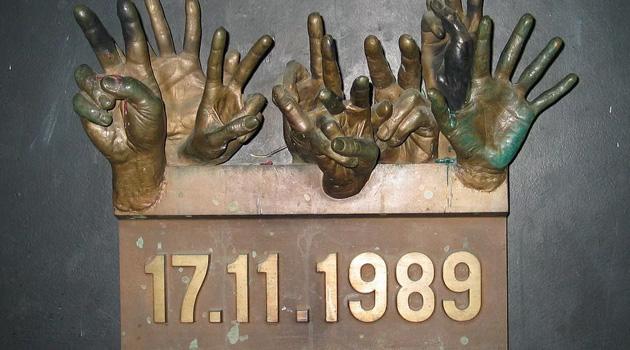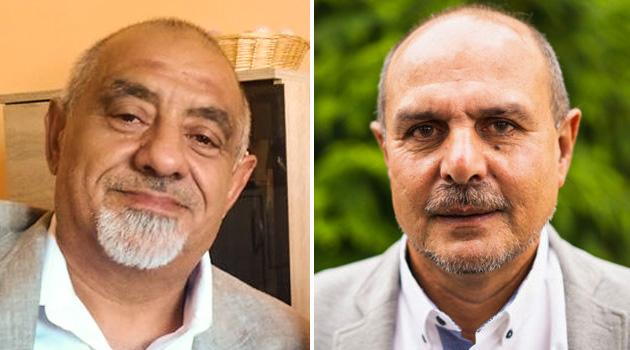Květoslava Podhradská: Czechoslovakia's Velvet Revolution as seen by an ordinary Romani woman

In the spring of 1989, I moved with my family and my husband at the time from Ostrava to Svitávka – we were rather well-off back then, living in a spacious apartment and, as they say, we “had our own”. That autumn, nursery school obligations began for the children once again.
I accompanied the children to preschool, hurried to my job, went shopping after work, came home, cooked dinner – a cycle that repeated daily. One day, though, everything was different.
On my way home from work I saw a bunch of my neighbors standing outside in front of our building, debating the “unrest in Prague”. I asked them what the unrest had been, what it meant.
I didn’t understand the first thing about it. Somebody in the crowd said some “hooligans” in Prague had assaulted the public security forces.
People said the “hooligans” had smashed everything up and were brawling with everybody right off the bat. I was startled.
“Hooligans, you say? For God’s sake! Why are they letting them do it?” I asked, joining the group.
“It’s a big deal, they’re attacking the cops and people and smashing up everything around them, they don’t care about anything, those hooligans,” a neighbor answered, shifting his net bag full of beer bottles to his other hand. I went home none the wiser about what was actually going on.
My husband wasn’t home yet, so I turned on the television to see the news. There was almost nothing about the incident on tv, just a brief news item that “anti-socialist elements and various hooligans” were “inciting provocations” in Prague and that the police had intervened against them on Friday, 17 November.
I was just an ordinary woman who did everything the way the regime set it up – I went to my job, I raised my family, I fulfilled my duties. I was 28 at the time, and the following day my son would turn three.
Early the next morning I went to Boskovice to buy his gift. Just as had happened the day before, people in Boskovice were also assembling on the street, but these people were passing out strips of red-white-and-blue ribbon and shouting different slogans.
“Freedom! We want Freedom! Freedom!”
Fear gripped me – I was afraid of them. There was an unusually large number of people on the street.
I got out of my parked car and walked toward the toy shop. Suddenly a man stepped into my path, shoved a ribbon into my hand, said “Put it on”, then shouted again at full volume: “Freedom! Down with one-party rule! Freedom!”
He wasn’t the only one yelling – more people, crowds of them, gradually joined him. That was when I, an ordinary woman with children, comprehended what was actually going on in Prague.
The “hooligans” actually had not been hooligans at all, as Czechoslovak Television, controlled by the Communists, did its best to imply – they were students. They were normal youths waving the country’s flag over their heads and wanting just one thing, for people to finally experience democracy and freedom.
In addition to calling on us, the ordinary citizens and people of this country, to join them, they were also calling on academics, actors and artists to do so. Young people began collecting signatures on a petition demanding that the socialist Government resign.
I signed that petition too. All of Czechoslovakia was fighting intensively for freedom, truth and love.
People grew closer to each other during that time. Back then the gadje (non-Roma) were closer to the Roma and vice versa.
Ever since the revolutionary week that began on 17 November 1989, however, we have not resumed that mutual sincerity. I remember it was freezing in Boskovice, my hands were cold, I put the ribbon I was holding in my pocket and looked for a familiar face.
I didn’t see anybody I knew in the crowd. I gave up trying to find anybody.
I smoked a cigarette for a while, leaning against a dilapidated building and observing the craziness in the streets. I took another drag on the cigarette, and suddenly it was as if I had flown 21 years back in time.
It seemed to be 1968, when I was just seven years old. Back then we lived in Ostrava, not far from the Odra river, downhill from which the Russians had set up camp.
The Russians guarded that camp with machine guns in their hands. I used to watch them patrolling along the river, and if they ever caught sight of me, I would run away fast – I was so scared back then.
That Russian invasion had lasted more than 20 years. Now, in 1989, the invasion would end.
The Velvet Revolution was in full swing, and people were telling each other that only changes for the better lay ahead. The changes were enormous, the year 1990 was one of big adjustments and unheard-of freedom for Czechoslovakia.
Personally, the revolution just brought me the loss of my job – and other kind of security. The money we had saved up was slowly running out when fortune smiled on me after two months of intensive job-hunting, and I got a position in a gardening enterprise.
Life again ran along familiar tracks – job, children, school. Then when my daughter graduated from high school in 2004, another change happened.
Zuzka decided she and her boyfriend would go to England on vacation. She ended up staying there for good.
Back then I was aware that during totalitarianism, she would never have had the opportunity to travel. Six months later, I was able to go visit her without anybody interrogating me or persecuting me, either.
The Czech Republic’s entry into the Schengen area made it possible for us to travel without any restrictions to more than 20 European states. For many Romani people from the former Czechoslovakia, that opportunity was a big challenge.
The desire to try out life abroad was more than tempting. The post-revolutionary time didn’t just bring us freedom of movement, though.
Romani people were frequently forced to emigrate because of the growing levels of unrest and violence targeting them in particular. Those of us who remained had to face the music of antigypsyism in full swing.
Nobody back then was prepared for this – but nobody ever questioned it, either. Segregation in the schools here in Ostrava kept on going full throttle even after the fall of communism.
There were problems with accessing housing, too. There has been high unemployment.
There have been pogroms. There have been racist murders that have shaken Romani people’s faith that the state could manage to protect them, and this forced many people to emigrate wherever they could, anyplace where nobody would hold their Romani origins or their skin color against them.
I, too, lived abroad for five years, but recently I decided that I don’t want to live “outside” anymore, despite the fact that I am aware that life for Roma in the Czech Republic is not easy. I have come back to where I feel I have my roots, and above all, to where my homeland is.
